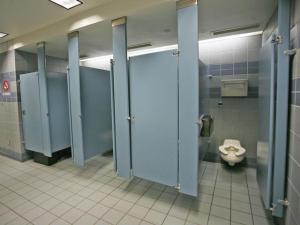Once again, after being forced to urinate and defecate in the dull and stinky men’s room in the building at the university where I teach, I think once again about the relationship between not just mansex and the men’s room, but the whole sociology of the bathroom.
First of all, the fact I am saying bathroom is significant, because in this dull and stinky men’s room with the constant problem of the unflushed toilet (it is supposed to flush automatically, it does not always do so), there is no bath. La salle de bains? No. Showers are available in the gym, of course, but no bathtub. Why not just call the room the sink/toilet/urinal room?
Second, why are public bathrooms in general such blah physical spaces (unless the ones in expensive spaces)? Yes, they are a public space, and utilitarian in the most basic way, but it seems, not that I would know this, the ladies’ rooms aren’t that different. The luxurious rooms with cushions, chairs, and couches I used to notice in movies made in the 1960s aren’t, or perhaps never were, the norm.

The unisex/disabled (not parallel terms) restroom the university recently constructed is clean and efficient, and also, and this is a plus to many, private. Single occupancy. Now, that might be interesting, to lock the door and enjoy some action, but that might create more potential for getting caught than doing a quickie in a stall. Knock, knock. Who’s in there? I have to go … I’m calling security.
Thirdly, the issue of privacy is something that seems to be more exclusive to contemporary American/Western culture. Contemporary, I emphasize, because in early modern Europe, urination and defecation weren’t exclusively private acts. People “went” when and where they needed to. Separate bathrooms with plumbing were a luxury, and even those in the upper classes used the chamber pot whenever and wherever, even when dining. Some dining areas and other public rooms contained elaborate close stools for convenient evacuation. The aesthetic features of these receptacles, one could say, were designed to conceal the act as well as blend the object into the overall luxury of the space, but it was clear what people were doing in them. At least, in much humbler settings an outhouse was a private, separate building, but not exactly the jolly T-room.

I’ve often thought, and perhaps my view reflects how Americans have insisted on enclosing the space and judging a person or institution or business by the cleanliness of their bathroom, that the actual bath and shower should be more separate from the toilet. The juxtaposition of the toilet and the bathing area creates a tension between purity and danger, as Mary Douglas in her book by that title explains. The danger is the expulsion of waste, the crossing of a physical boundary, in this case, the body, however natural this process. It’s not just that the waste itself is toxic or gross, physically. More than instinctual repulsion is going on here, more than concerns about health. We feel the need to control this process, enclose it in a pristine setting. The place to dump the waste must be the cleanest, purest, most private room, treated like a sacred shrine. The toilet is the porcelain god.
Thus, when one puts sex into the bathroom space, the act itself a crossing of physical boundaries which also involves a change of fluids, this purity and danger tension exacerbates. It is interesting that in one’s own private home, one doesn’t usually see the bathroom as a place of sexual activity. It’s the bedroom. One sleeps with another person, and the sleeping verb is a common euphemism for sexual intimacy. Yet, sex acts, anonymous sex, occur in public bathrooms.
Perhaps the connection here is between the words anonymous and public. Any time one even goes into a public space, one is taking a risk, because one is in the position of being seen by others at various levels of intimacy, and in the case of bathroom or toilet sex, what is deemed private becomes public in a space which is enclosed, private, for a private act. One now can see what one has fantasized about seeing. It’s the one moment of connection, the ultimate boundary crossing, the danger, the thrill, the orgasm mixed together in a space designed to enclose a natural, albeit for most, non-erotic process.



 Join our Email List
Join our Email List Like Us on Facebook
Like Us on Facebook Instagram
Instagram Youtube
Youtube Follow Us on Twitter
Follow Us on Twitter Follow us on Pinterest
Follow us on Pinterest